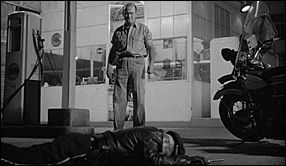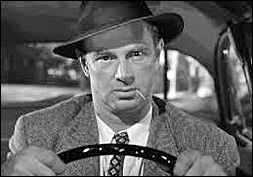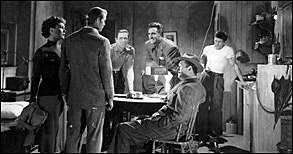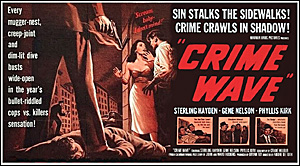Sat 9 Dec 2017

CRIME WAVE. Warner Brothers, 1953. Sterling Hayden, Gene Nelson, Phyllis Kirk, Ted de Corsia, Charles Bronson (as Charles Buchinsky), Jay Novello, Ned Young, Dub Taylor. Director: André De Toth.
Here’s a relatively unknown film noir that I recently saw for the first time, and if you haven’t seen it, it’s one I’m pleased to recommend to you without a single reservation. Or if you have seen it but not recently, why not watch it again? It’s one of those films that you see more of it every time you watch it.

It isn’t much of a crime wave. A small gang of ex-cons are pulling a small series of gas station robberies. The police assume that they’re only after eating money, as the take they get is never more than a few hundred dollars. But when their latest job costs the life of a motorcycle cop who stops to investigate, the attitude of the police changes dramatically, starting with Det. Lt. Sims, played by Sterling Hayden, who towers majestically over everyone, laconically shooting out his dialogue in torrents, tommy-gun fashion.
Caught in between the police and the holdup gang is Gene Nelson and his wife, Phyllis Kirk. He’s out on parole, has a good job, and wants nothing to do with his former cell mates, but when they invade his home and hold his wife hostage, he has no choice to go along with them, and the plan they’re working on next.

The movie has filmed in only 13 days, and mostly on location in the greater Los Angeles area, giving the film a sense of immediacy that it might not otherwise have.
On a personal level, Lt Sims is adamantly against the idea of parole — once a con always a con — and to me this is Starling Hayden’s movie all the way. Gene Nelson does his best, but standing up against this hulking nemesis of a police officer? No way, no how.
Even if the ending is a little rushed (and all does end well), as a well-photographed crime thriller, that, well — go back and read my first paragraph again.

December 9th, 2017 at 2:16 am
I liked this a lot also. I gave it a 9 out of 10 and Sterling Hayden is excellent. Only 73 minutes. My dvd came in a great Warner Brothers box set of 10 film noirs, all packed with extras like commentaries and features.
December 9th, 2017 at 9:08 am
Nelson was a dancer, and he does a fine job here of trying to maneuver between the crooks & the cops. As for Hayden, it’s one of those strong parts like he had in ZERO HOUR that defines the film.
December 9th, 2017 at 5:35 pm
I think this is a major film noir, too.
As Steve says, its strong point is its excellent visuals and photography.
December 9th, 2017 at 5:44 pm
A small solidly made film raised by a smart script and by the presence of Hayden.
Nelson was moving from actor to director about this time, and while he still acted after, gradually moved more and more behind the camera like Don Taylor. He was personable and capable enough on screen, but never really held it like the best stars do.
This is probably his best strictly dramatic performance in a film.
Andre de Toth was always capable directing a Western or a noir or any combination of the two. He usually got the best from any actor he directed.
August 7th, 2019 at 12:34 am
Great early Bronson role, from back when he was acting, not just conveying his Bronsonness. Timothy Carey is at his vilest!
But despite a noirish aesthetic, I kinda found the ending a bit too upbeat and pat for the film to really be a true noir. Everything is returned to normalcy, justice prevails, Gene gets his life back, and the cops are really good guys after all!
Good film tho’.